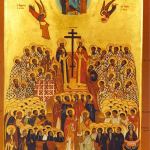
In his excellent The Ragamuffin Gospel, Brennan Manning mentions the limited Antonio Salieri, court composer to the Holy Roman Emperor, who was conscientious, devout, and wildly jealous of the wildly gifted Mozart who–neither conscientious, nor devout–tossed off sublime music in the interludes of a life of “wine, women and song, and he didn’t sing much.”
Nevertheless, at the end of each piece of limited, uninspired music, Salieri added a postscript, “Grazie Signore.” Thank you, Lord.
Manning continues,“Grazie Signore, for other people who have greater gifts than mine.”
And that was a prayer I had never thought of praying.
* * *
Those of us brought up by restless parents with unfulfilled ambitions—and I guess that’s many of us!!—have, from childhood, absorbed ambition and striven to be the best, to win the prize, the first prize, if there are two.
An Oxford undergraduate recently told me that at school, she had to be the thinnest, the cleverest, the best in every field she was interested in, and there were many. At Oxford, however, faced with myriad people just like her, this drive made her ricochet between anorexia and bulimia. And exhaustion. Always exhaustion.
Oh, I know all about burnout and exhaustion (though not about slenderness!)
“If you do one good deed, your reward usually is to be set to do another and harder and better one,” C. S. Lewis, The Horse and His Boy. Since success elevates us to a vaster ocean, this drive to be the best will inevitably burn us out and exhaust us, diminishing potential achievement.
And worse, should God ever grant a foolish Salieriesque desire to be the best, some interest and challenge would leach away from our world. It is a blessing I take for granted—that in my social circles, professional circles and online circles, I continually encounter those who are more intellectually gifted, creatively gifted, spiritually gifted, and better read. Always someone to learn from.
We all take that blessing for granted. Even the greatest living scripture expositor, speaker, scholar, writer, prophet or mystic still has much to learn…from the great cloud of witnesses who have gone before us, leaving silvery snail trails to inspire…
So that’s it for envy—an occupational hazard of writers, according to Bonnie Friedman in her Writing Past Dark. Let me shed it with unforgiveness, and other cancers of the mind.
Grazie Signore, I resolve to inwardly rejoice whenever I read a writer or a blogger quite obviously better than I am.
Grazie Signore, for all those who write with the pen of angels, for they fill the world with exquisite language.
Grazie Signore, for original thinkers who make me too think.
Grazie Signore for the well-stocked mind of scholars.
Grazie Signore for all those who garden better than I, for in meandering around their gardens, I learn.
Grazie Signore for those read your word more deeply than I do, for they show me new things in it.
Grazie Signore, for those who encounter you more deeply than I do, who see your face more clearly, hear your voice more distinctly, for I learn more about you from them.
Grazie Signore, for those who are spiritually gifted, the speakers who revive my flagging spiritual fervour; the prophets who can tune into your thoughts; the mystics who can see your face and feel your heartbeat.
Grazie Signore, for the world so rich, so full of gifts, which you pour freely on all men and women.
Tweetable
Brennan Manning’s prayer: Grazie Signore, thank you, Lord, for those who have greater gifts. 







